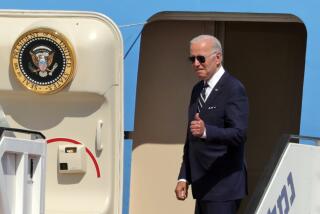Bush Backed ‘Risky’ Iran Arms Deal, Memo Shows
- Share via
WASHINGTON — Vice President George Bush joined President Reagan in fully supporting a “risky operation” to win the freedom of American hostages in Lebanon by selling arms to Iran, according to a White House memo made public today.
The Senate Iran-Contra committee said the newly discovered memo represents “the first evidence (albeit hearsay) that the committees have found concerning the vice president’s position on the Iran initiative.”
The Feb. 1, 1986, memo was written by Rear Adm. John M. Poindexter, then Reagan’s national security adviser, to Robert C. McFarlane, his immediate predecessor.
The memo noted that Secretary of State George P.Shultz and then-Defense Secretary Caspar W. Weinberger “still disagree on policy grounds” on the wisdom of the venture.
It asserted that Atty. Gen. Edwin Meese III, the late CIA director, William J. Casey, and then-White House Chief of Staff Donald T. Regan are “fully on board this risky operation. . . .”
Then, referring to Reagan and Bush, the memo said, “But most importantly, President and VP are solid in taking the position that we have to try.”
The committee said the memo confirms the testimony last summer of Shultz and Weinberger “that the President was fully aware of the risks in the Iran initiative but decided to proceed.”
The memo is one of 96 electronic messages obtained recently from White House computers through a program developed by committee experts.
In a joint statement, Chairman Daniel K. Inouye (D-Hawaii) and Vice Chairman Warren B. Rudman (R-N.H.) said the notes contain “no information that would alter the committee’s conclusions or the facts described” in the final report of the Senate and House panels.
Poindexter used the Feb. 1, 1986, memo to report the assertion of Iranian go-between Manucher Ghorbanifar that the hostages would soon be released.
More to Read
Get the L.A. Times Politics newsletter
Deeply reported insights into legislation, politics and policy from Sacramento, Washington and beyond. In your inbox twice per week.
You may occasionally receive promotional content from the Los Angeles Times.










